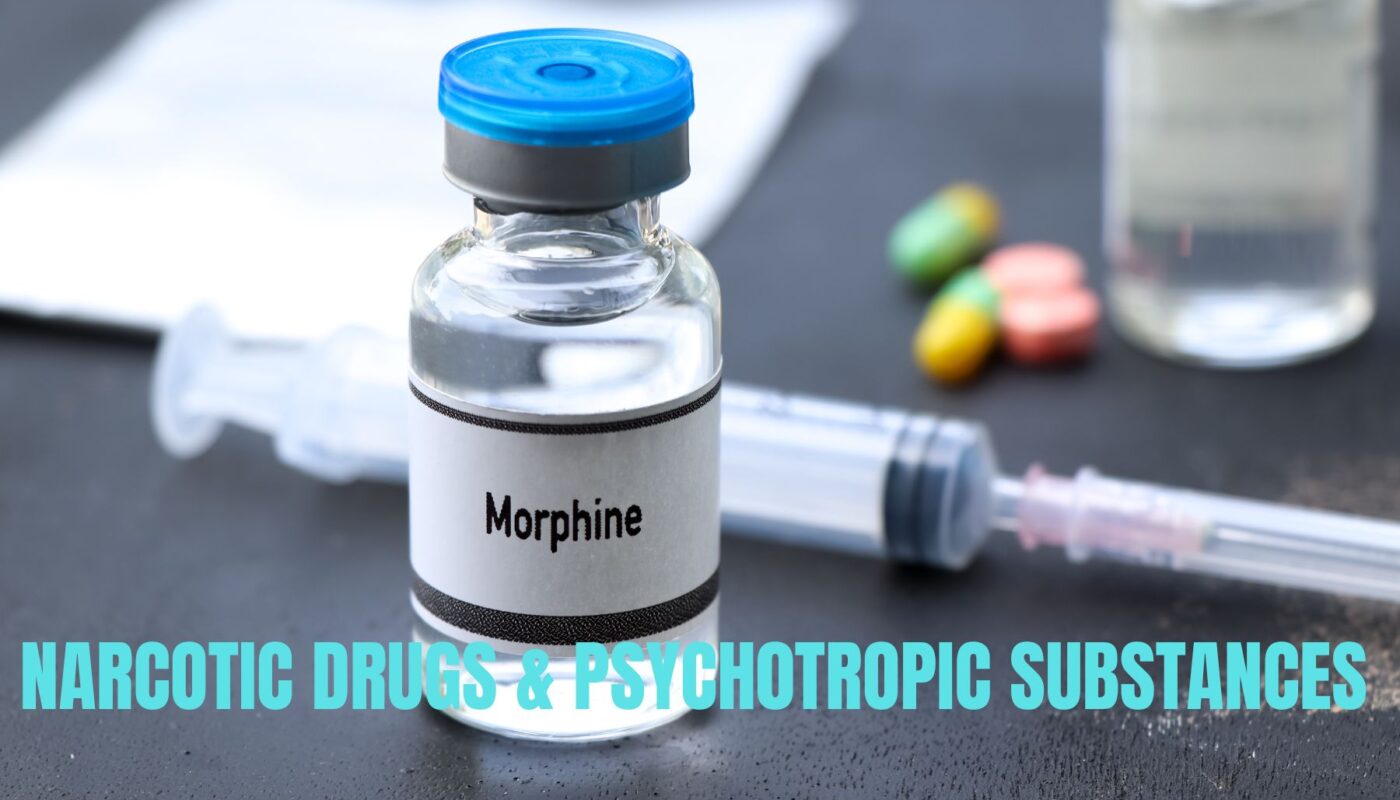Objectives: To take measures for preventing, combating and regulation of operations relating to narcotic drugs and psychotropic substances. To provide for the forfeiture of property derived from or used in, illicit traffic in narcotic drugs and psychotropic substances
Prohibition of Activities under the NDPS Act: The NDPS Act prohibits a person from the production/manufacturing/cultivation, possession, sale, purchasing, transport, storage, and/or consumption of any narcotic drug or psychotropic substance.
Classification of Narcotic Drugs and Psychotropic Substances: According to the Act, narcotic drugs encompass substances like coca leaf, cannabis (hemp), opium, and poppy straw, while psychotropic substances include materials protected under the Psychotropic Substances Convention of 1971, whether natural, synthetic, or in the form of salts or preparations.
Establishment of the Narcotics Control Bureau: In 1986, the Narcotics Control Bureau (NCB) was established in accordance with the provisions of the NDPS Act to enforce drug-related laws and combat drug abuse effectively.
Role of the Narcotics Control Bureau: The NCB is a nodal agency that is responsible for coordination with various ministries, other offices & State/Central enforcement agencies with regard to drug law enforcement and also in respect of matters relating to drug abuse.
Seizure and Forfeiture of Property: Under the Act, property acquired by a person from drug-related offences, who has been convicted under the Act can be seized, frozen and forfeited by the government.
Non Bailable Offense: All the offences under the NDPS Act are non-bailable.
Restrictions on Relief for Drug Convicts: Also, no relief can be sought by the drug convicts by termination, remission, and commutation of sentences passed
Definitions of Small Quantity and Commercial Quantity as per the NDPS Act: According to the NDPS Act, the following are the current definitions of a small quantity and a commercial quantity for some of the most common drugs:
| Drugs & Psychotropic Agents | Small Quantity | Commercial Quantity |
| Amphetamine | 2 grams | 50 grams |
| Charas (cannabis resin) | 100 grams | 1 kilogram |
| Cocaine | 2 grams | 100 grams |
| Ganja (cannabis bud) | 1 kilogram | 20 kilograms |
| Heroin | 5 grams | 250 grams |
| LSD | 2 milligrams | 100 milligrams |
| Methadone | 2 grams | 50 grams |
| Morphine | 5 grams | 250 grams |
| Opium | 5 grams | 2.5 kilograms |
Important sections under the NDPS Act
Section 3: According to Section 3 of the NDPS Act, the Central Government has the right to add or remove such substances or natural materials or salts or preparations of such substances or materials from the list of psychotropic substances
Section 8(c): According to Section 8(c), It is unlawful for anyone to cultivate any coca plant or gather any Portion of coca plant, or cultivate the opium poppy or any cannabis plant or produce, manufacture, possess, sell, purchase, transport, warehouse, use, consume, import inter-State, export inter-State, import into India, export from India or transship any narcotic drug or psychotropic substance.
Chapter 4 Section 15-40 Offences and Penalties: The penalties under this Act are severe considering the consequences of drug abuse and its trafficking. The offences under the Act attract jail terms ranging from one year to 20 years and fine depending on the crime. Under the Act, abetment, criminal conspiracy and even attempts to commit an offence attract the same punishment as the offence itself. Preparation to commit an offence attracts half the penalty. Repeat offences attract one and a half times the penalty and, in some cases, the death penalty.
Section 27: Various punishments are laid out in this section for the consumption of narcotic drugs or psychotropic substances
Section 35 of the NDPS Act: deals with the presumption of the culpable mental state of an accused in this section culpable mental state includes intention motive, knowledge of a fact and belief in, or reason to believe, a fact
Section 36A: A clause in Section 36A of the NDPS Act called ‘non-obstante’ empowers the Special Court to hear cases punishable by imprisonment for more than three years. This provision is intended to ensure speedy trials.
Bail under the NDPS Act: Section 37 of the NDPS Act deals with the issue of cognizable and non-bailable offences. In Section 27 of the NDPS Act, it is stated that all offences punishable under the Act are cognizable and that no person accused of an offence punishable under the Act will be released on bail or his bail unless certain conditions are met.




This design is steller! You certainly know how to keep a reader entertained. Between your wit and your videos, I was almost moved to start my own blog (well, almost…HaHa!) Fantastic job. I really loved what you had to say, and more than that, how you presented it. Too cool!
We are a gaggle of volunteers and opening a brand new scheme in our community. Your website offered us with valuable information to paintings on. You’ve performed an impressive activity and our entire group will likely be grateful to you.
Hi there, You have done a great job. I抣l certainly digg it and personally recommend to my friends. I’m confident they’ll be benefited from this web site.
I have seen that expenses for online degree specialists tend to be an excellent value. Like a full College Degree in Communication in the University of Phoenix Online consists of Sixty credits at $515/credit or $30,900. Also American Intercontinental University Online offers a Bachelors of Business Administration with a total education course element of 180 units and a cost of $30,560. Online learning has made taking your education far more easy because you might earn your degree from the comfort of your house and when you finish from office. Thanks for other tips I have really learned from your site.